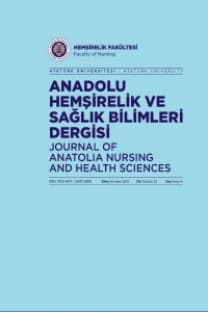REHBER HEMŞİRELİK KURSUNUN HEMŞİRELERİN REHBER HEMŞİRELİK HAKKINDAKİ GÖRÜŞLERİNE ETKİSİ
Hemşire, rehber hemşire, hemşirelik eğitimi
EFFECTS OF MENTORİNG COURSE ON THE OPİNİONS OF THE NURSES ON MENTOR
Nurse, guide nurse, nursing education,
___
- Sharif F. Masoumi S. A Qualitative Study of Nursing Student Experiences of Clinical Practice. BMC Nurs. 2005;4:6.
- Sawatzky JA, Enns CL. A Mentoring Needs Assessment: Validating Mentorship in Nursing Education. 2009;25(3):145-50.
- Salminen L, Minna S, Sanna K, Jouko K, Helena LK. The Competence and The Cooperation of Nurse Educators. Nurse Education Today. 2013;33(11):1376-81.
- Nettleton P, Bray L. Current Mentorship Schemes Might Be Doing Our Students A Disservice. Nurse Education in Practice. 2008;8(3):205-12.
- Moran M, Banks D. An Exploration of the Value of The Role of The Mentor and Mentoring in Midwifery. Nurse Education Today. 2016;40:52-6.
- Kocaman G, Yürümezoğlu AH. Türkiye’de Hemşirelik Eğitiminin Durum Analizi: Sayılarla Hemşirelik Eğitimi (1996-2015). Yükseköğretim ve Bilim Dergisi. 2015;5(3):255-62.
- Kocaman G, İntepeler ŞS, Şen H, Yürümezoğlu AH, Özbıçakçı Ş. İşe Yeni Başlayan Hemşirelerin Uyumlarını Kolaylaştırmak İçin Hazırlanan Bir Rehber Hemşire Eğitim Programı Örneği. Hemşirelikte Eğitim ve Araştırma Dergisi. 2012;9(2):28-34.
- Karaöz S. Hemşirelik Eğitiminde Klinik Değerlendirmeye Genel Bakış: Güçlükler ve Öneriler. Dokuz Eylül Üniversitesi Hemşirelik Yüksekokulu Elektronik Dergisi. 2013;6 (3),149-58.
- Huybrecht S, Loeckx W, Quaeyhaegens Y, DeTobel D, Mistiaen W. Mentoring in Nursing Education: Perceived Characteristics of Mentors and The Consequences of Mentorship. Nurse Education Today. 2011;31:274-8.
- Hunt LA, McGee P, Gutteridge R, Hughes M. Failing Securely: The Processes and Support Which Underpin English Nurse Mentors' Assessment Decisions Regarding Under-Performing Students. Nurse Education Today. 2016;39:79-86.
- Hawkins JW, Fontenot H. Mentorship: The Heart and Soul of Health Care Leadership. Journal of Health Care Leadership. 2010;2:31–4.
- Faydalı S, Çayır A. Mentoring, Nursing Students’ Opinions; a Pilot Study. International Journal of Humanities and Social Science Invention. 2016;5(12):102-8
- Esenay IF. Hemşirelik Uygulamalarında Öğrenme Ortamı. Platin N, editör. Hemşirelik Uygulama Eğitiminde Rehberlik. 1. Baskı. Ankara: Hedef Yayıncılık;2013. p. 31-42.
- Elcigil A, Yildirim Sari H. Determining Problems Experienced by Student Nurses in Their Work with Clinical Educators in Turkey. Nurse Educ Today. 2007 Jul;27(5):491-8.
- Dorsey LE, Baker CM. Mentoring Under Graduate Nursing Students. NurseEducator. 2004;29(6):260-5.
- Dobrowolska B, McGonagle I, Kane R, Jackson CS, Kegl B, Bergin M, et al. Patterns of Clinical Mentorship in Undergraduate Nurse Education: A Comparative Case Analysis of Eleven EU and NonEU Countries. Nurse Education Today. 2016;36;44– 52.
- Çayır A, Faydalı S. An Attempt for One-To-One Mentorship Model; Opinions of Mentor Nurse. Journal of Human Sciences, 2017;14(1):281-93.
- Chow FLW, Suen LKP. Clinical Staff as Mentors in Pre-Registration Undergraduate Nursing Education: Student’s Perceptions of The Mentor’s Roles and Responsibilities. Nurse Education Today. 2001:21;350–58.
- Chen Y, Watson R, Hilton A. A Review of Mentorship Measurement Tools. Nurse Educ Today. 2016;40:20-8.
- Carlisle C, Calman L, Ibbotson T. Practice-Based Learning: The Role of Practice Education Facilitators in Supporting Mentors. Nurse Educ Today. 2009; 29(7): 715-21.
- Büyük ET, Rızalar S, Çetin A, Sezgin S. Hemşirelerin İntörn Eğitim Uygulaması Hakkındaki Görüş ve Önerileri. Balıkesir Sağlık Bilimleri Dergisi. 2014;3(3):135-40.
- Burns I, Paterson IM. Clinical Practice and Placement Support: Supporting Learning in Practice. Nurse Educ Pract. 2005;5(1):3-9.
- Bray L, Nettleton P. Assessor Or Mentor? Role Confusion in Professional Education. Nurse Education Today, 2007;27(8):848–55.
- Botma Y, Hurter S, Kotze R. Responsibilities of Nursing Schools with Regard to Peer Mentoring. Nurse Educ Today. 2013;33(8):808-13.
- Bedük T, Köroğlu E. Hemşirelik Uygulama Eğitiminde Öğretim Elemanının Sorumlulukları. Platin N, editör. Hemşirelik Uygulama Eğitiminde Rehberlik. 1. Baskı. Ankara: Hedef Yayıncılık;2013. p. 63-70.
- Ay F. Hemşirelik Eğitiminde Yeterliliğin Sağlanması İçin Yeni Bir Yaklaşım: Rehber Hemşire (Koçluk) Sistemi. Fırat Sağlık Hizmetleri Dergisi. 2007;2(5):52-65.
- Andrews M, Brewer M, Buchan T, Denne A, Hammond J, Hardy G et al. Implementation and Sustainability of The Nursing And Midwifery Standards for Mentoring in The UK. Nurse Educ Pract. 2010;10(5):251-5.
- Ançel G. Hemşirelik Uygulama Eğitiminde Rehberlik, Rehberin Sorumlulukları. Platin N, editör. Hemşirelik Uygulama Eğitiminde Rehberlik. 1. Baskı. Ankara: Hedef Yayıncılık;2013. p. 43-54.
- Akyüz A, Tosun N, Yıldız D, Tosun N, Kılıç A. Klinik Öğretimde Hemşirelerin, Kendi Sorumluluklarına ve Hemşirelik Öğrencilerinin Çalışma Sistemine İlişkin Görüşleri. Koruyucu Hekimlik Bülteni. 2007;6(6):459-64.
- ISSN: 1309-5471
- Yayın Aralığı: 4
- Yayıncı: Atatürk Üniversitesi Hemşirelik Fakültesi
KRONİK KALP DAMAR HASTALIĞI OLAN BİREYLERİN HASTALIK ALGISININ İNCELENMESİ
Gulcan Bagcivan, Esra Tanrıver, Betülay Kılıç
REHBER HEMŞİRELİK KURSUNUN HEMŞİRELERİN REHBER HEMŞİRELİK HAKKINDAKİ GÖRÜŞLERİNE ETKİSİ
Serpil SÜ, Aliye ÇAYIR, Bilgen ÖZLÜK, Emine GEÇKİL
Sevgi VERMİŞLİ PEKER, Meryem YAVUZ VAN GIERSBERGEN, İbrahim ÇUKUROVA, Bilgen ULAMIŞ
DUYUSAL BOZUKLUKLARI OLAN ÇOCUK VE HEMŞİRELİK BAKIMI: İŞİTME SORUNU OLAN ÇOCUĞA YAKLAŞIM
CERRAHİ ALAN ENFEKSİYONLARININ ÖNLENMESİNDE AMELİYAT SÜRECİNDE NORMOTERMİNİN SAĞLANMASI*
Betülay KILIÇ, Gülcan BAĞCIVAN, Nalan AKBAYRAK, Hatice SÜTÇÜ ÇİÇEK
CERRAHİ ALAN ENFEKSİYONLARININ ÖNLENMESİNDE AMELİYAT SÜRECİNDE NORMOTERMİNİN SAĞLANMASI
